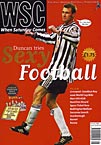 Richard Mason reflects on Fiorentina's explusion from the UEFA Cup and what it means for media objectivity
Richard Mason reflects on Fiorentina's explusion from the UEFA Cup and what it means for media objectivity
The exclusion of Fiorentina from the UEFA Cup has naturally provoked a lot of comment in Italy, but one aspect of the affair has been entirely ignored: its implications for media companies such as Sky and Carlton seeking to buy into football clubs.
Fiorentina’s problems began with the explosion of a firecracker which injured the fourth official as the players were leaving the field for half-time during the second leg of their UEFA Cup second round match against Grasshoppers Zürich. The game was played in the “neutral” stadium of Salerno, south of Naples, because of previous incidents involving Fiorentina fans at their home ground, and it seemed clear that the intention of the perpetrator, almost certainly a Salernitana ultra, was to damage Fiorentina following incidents in the League game between the two clubs nine days previously.
Defenders of Fiorentina were quick to argue that UEFA’s decision to expel the club could give carte blanche for supporters of, say, Milan to gain entry to Inter’s European matches and then cause trouble hoping to see their city rivals thrown out in similar fashion. Among the keenest to push this line were the commentators from Tele Monte Carlo, which was covering the match live.
They presented the situation from a point of view as favourable as possible to Fiorentina, which is not surprising when you consider that their boss at TMC, film producer Vittorio Cecchi Gori, is also the Fiorentina president, and that he bought TMC with the avowed intention of providing Fiorentina with the sort of exposure Silvio Berlusconi’s ownership of Mediaset has given to Milan.
The TMC line on the incident consisted of trying to disassociate Fiorentina entirely from what had happened. We were told, for instance, that Fiorentina had chosen to play the match at Salerno so that the receipts could go to the victims of May’s disastrous floods and landslides in Campania, and particularly in the province of Salerno. True, but totally irrelevant, and in any case Cecchi Gori’s decision probably had more to do with boosting his own and Fiorentina’s image than with any sudden outbreak of altruism. He could give the equivalent of the match receipts from his own personal fortune without even noticing it.
We also heard that the Fiorentina supporters who had travelled to Salerno for the match had behaved impeccably. It was only from non-TMC sources that we learnt there had in fact been less than sympathetic chanting in reference to the floods and landslides. Not that this justifies or explains the throwing of the firecracker. It is just that it would appear the match was not being played in the idyllic atmosphere of friendship and solidarity that TMC was trying to manufacture.
However, the most offensive aspect of the coverage was the attempt to involve Grasshoppers. When it became clear that they were not keen for the game to restart, TMC repeatedly showed pictures of the explosion with not a Grasshoppers player in sight – they were already in the “ante-tunnel”, the retractable structure that leads to the tunnel on many Italian grounds. We were told they were claiming that the shock of the explosion had affected some of the players to the extent that, if they game resumed, they would not be able to give their best. This, it was implied, could not be true, and was just a ploy to force an abandonment of a tie Fiorentina were winning comfortably.
For what it’s worth, having heard many firecrackers explode in Italy, I think it’s perfectly possible that the shock of an explosion at, say, 20 metres, when you are in a confined space, could easily disorientate a player. The comments ignored the essential point that firecrackers should not be brought into stadiums in the first place, and that, as guests of Fiorentina (and Italy), Grasshoppers deserved a bit more consideration.
UEFA’s final decision on the matter – to exclude Fiorentina from this year’s UEFA Cup, but to impose no further ban or ground closure – was a wise one. It maintained the principle that the home club is responsible for the organisation of its matches, wherever they are played, while tacitly acknowledging that Fiorentina were to a certain extent victims in this case. To take no action or to order a replay would have been to set a far more dangerous precedent.
The repercussions of the case rumble on. It has already been rumoured that “reprisals” are being planned by Fiorentina supporters when Salernitana visit nearby Empoli in February. But the immediate lesson is this: when the owner of a media concern is also the owner of a club, you can forget about objective coverage of any issue that materially affects the club’s future.
From WSC 143 January 1999. What was happening this month